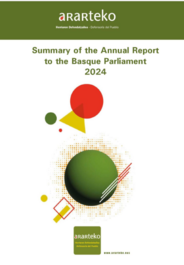The Ararteko has prepared a summary of its 2024 Annual Report in English and French to share the main lines of its content at the international level. This synthesis of the institution’s activities in 2024 begins with an overview of the most significant statistical data, followed by a presentation of the key highlights of the work carried out by its different areas of activity. In each case, the summary aims to underscore what are the most relevant achievements or highlights of the year.
The purpose of making this report available internationally is to inform peer institutions about the most important aspects of the institution's work and, in doing so, pave the way for future exchanges of concerns and best practices among Ombuds institutions that share the common goal of advancing citizens' rights.
During 2024, the Ararteko carried out a total of 14,608 actions in the Basque Country (a slightly higher figure than the previous year), out of which 4,310 correspond to citizen complaints and inquiries and 28 to own initiative proceedings. A total of 10,150 actions were recorded at the direct assistance bureaus, both in person and through the telephone service
In 2024, the thematic area with more complaints is social inclusion, accounting for 15.82% of the total. Matters related to processing of economic benefits, such as the income guarantee benefit or the minimum vital income, continue to stand out. However, it is noteworthy that the area that has seen the greatest increase is health, with a rise of 69.6% compared to the previous year, due to the health system being under stain. The number of files specifically related to groups that deserve special public attention continues to rise. When combined with the areas of family, children and adolescents, and equality and integrity of women, they represent 9.11% of all complaints, placing these topics among those generating the most claims.
The protection of the rights of children and adolescents remains a constant objective of this institution's activity. In 2024, the number of complaints filed that explicitly mention or involve children or adolescents was 623, representing 14.45% of all complaints submitted to the Ararteko. However, only one of these complaints was submitted by a minor. Also notable is the activity of the Ararteko’s Adolescents’ Council, which embodies the exercise of the right of children and adolescents to be heard. Other areas of special concern for citizens include housing, education, public sector personnel, goods and services of the administration, security, the treasury, transparency and good governance and the environment.
In 2024, the Ararteko elaborated a document with proposals for institutional reform was completed, titled “Considerations and Proposals for a Reform of the Ararteko Institution.” This proposal seeks to strengthen and consolidate the Ararteko institution due to its essential role in reinforcing democracy, the rule of law, good governance, and ultimately, in protecting and promoting human rights and fundamental freedoms.
Additionally, the Ararteko organized the Coordination Meeting of Spanish Ombuds institutions, which addressed the promotion of good governance as a standard that should be applied transversally to all administrative actions, permeating the relationship between citizens and public administrations.
Two studies were also presented aimed at raising social awareness to improve the situation of women's and LGTBI people's rights: “Sexist Attitudes among the Adolescent and Young Population of the Basque Country” and “Hate Speech and Attitudes against LGTBI People in the Basque Country.” Furthermore, a summer course was held on “The Challenges of Educational Equity and Schooling in the Basque Country.”
In 2024, the Ararteko’s international relations have been consolidated with other ombudsman offices and human rights defense organizations, through participation in the conference and general assembly of the IOI, as well as in meetings with Council of Europe authorities.
Source: Ararteko - Ombudsman for the Basque Country, Spain

